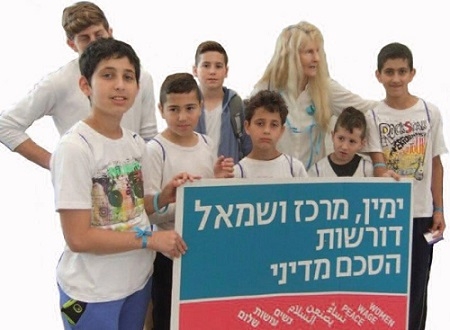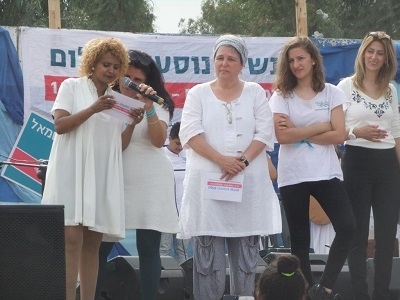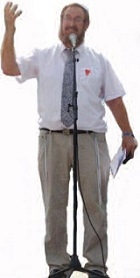Peace Train Gathers Momentum
During the Pesach holidays, over a thousand Jewish and Arab Israeli women dressed in white and walking two and three abreast from the Beit Shean train station in a seemingly never-ending human crocodile to a park in the center of the Jordan Valley town, had passing drivers rubbing their eyes in disbelief.
The slow-moving column was not re-enacting the exodus from Egypt which so many had been reading about and celebrating around the Seder tables a few days before. It was more of an in-gathering of women from all over the country, from very diverse walks of life but with one thing in mind – to live in freedom from hatred, division and wars!
Once close enough to read the signs held high by the women, the passing motorists seemed somewhat perplexed at the main message on large banners and blue, white and red placards. They read, "Right, Center and Left demand a political solution." Underneath that message was the name of the organization behind the day's event, Women Wage Peace, appearing in Hebrew, Arabic and English –maybe appearing in print a little too small for the heavy message it was attempting to send.
The majority of the women, who certainly represented an impressive cross-section of Israeli society, whether religious, political, cultural or ethnic, were also accompanied by a few score men and children. The members and supporters of the apolitical movement Women Wage Peace had literally spilled out in their hundreds from a special train dubbed 'The Peace Train' at Beit Shean, a town better known for its spectacular Roman and Byzantine archaeological site, as well as for the almost unbearable heat in the summer months and, as it turned out, also Pesach, 2017.
The train had begun its journey in Tel Aviv, collecting hundreds of WWP members and supporters at stations along the route to Beit Shean. Apart from the train passengers, scores more arrived in town in specially hired buses, private cars. Here and there, folks had walked or ridden bicycles from nearby kibbutzim and moshavim.
Symbolically, possibly, the Beit Shean station is the end of the line as far as train journeys go in this part of the country, although during the Ottoman period, the railway system built by the Turks would have taken one through this region, possibly having boarded a train in Egypt and alighted in Damascus. A short distance from the Beit Shean train station is the present-day border with the Hashemite Kingdom of Jordan and Sheik Husseini border crossing and bridge over the River Jordan.
One of the many poignant moments in the Women Wage Peace march and gathering in Beit Shean, was when those hundreds upon hundreds of walkers, determined to break down stereotypes and work toward living in a region without borders, passed under an enormous road sign, also in three languages, pointing to that border crossing of today.
I boarded the train at the Kfar Yehoshua-Yokneam station close to my kibbutz in the Jezreel Valley. Around a hundred women and children waited patiently on the platform and by the time the train specially hired by WWP actually pulled in some forty minutes late, the collective repertoire of peace songs had somewhat dried up and light-hearted jokes about the lateness or derailment of the peace train were rife.
Among those patiently awaiting the arrival of the peace train at this station was indefatigable peace activist Orna Shimroni, the bereaved mother of Lt. Eyal Shimroni who was killed in Lebanon. The leader of the 1997-founded Four Mothers Movement (so named in reference to Biblical matriarchs Sarah, Rebecca, Leah and Rachel) which contributed to the government's decision to pull the Israeli military out of Lebanon, Orna is one of the founders and takes care of an impressive memorial garden at Nahariyim honoring seven Israeli schoolgirls murdered that same year by a Jordanian soldier on the Island of Peace on the border with her Jordan Valley kibbutz of Ashdot Yaacov.
Orna was accompanied by seven of her grandsons who had come, together with their grandma and her WWP fellow members, to hold up signs and add their voices to the collective demand for a viable peace agreement.
Israeli Knesset member Yehuda Glick followed the mayors of Beit Shean and nearby town of Afula on stage. Both mayors expressed great support for the efforts of the WWP and said they had great hopes in the power of women to bring about change. But it was MK Yehuda Glick who was given rousing applause after opening his address by saying it was the second time that day he had been among a large number of people dressed in white, as before heading north to Beit Shean, he had attended the brachot of the Kohenim at the Western Wall.
MK Glick spoke of the strength and determination of Biblical woman and of their ability to bring about so many groundbreaking changes in their time and mentioned a number of women who had fought, and won, battles on behalf of women in the world to gain their deserved rights.
"I would like to make special mention today of Judge Sheila Abdus-Salaam of New York, the first Afro-American woman to be appointed to the State's Court of Appeals and who tragically died this morning in circumstances as of yet not clear. She and other woman throughout history were trailblazers," he said of Abdus-Salaam, adding "and you can be too".
"We want peace regardless of our political outlook and we will support any Israeli leader that leads us to peace," said one of the WWP speakers.
Representing the Twelve Tribes of Israel, the gathering was brought to an end by that number of women who came on stage one by one, each speaking for a few minutes about who they were and why they were participating in the WWP event.
They included a social activist from Ofakim, a member of the West Bank settlement of Tekoa, a Russian immigrant living in Beersheba who was one of the founders of the bilingual school in that city, an Arab Muslim accountant from Nazareth - a participant in a Jewish-Arab Shared Society project of Givat Haviva - a Christian Arab educator from Acre who declared "I am here, we are all here together," and an Ethiopian social worker and resident of Beit Shean who, apart from her professional career, directs a center highlighting the history and culture of Ethiopian immigrants. There were others too, who led a collective plea for the continuation of activism in order to achieve the common goal, a more peaceful existence for all Israelis and their neighbors.
A social activist from the Negev town of Dimona commented that "women speak with emotion because only they have the sense of motherhood, so immaterial of where, what or whom, we all speak the same language."
Another woman from the south was overheard saying that she had almost decided not to join in the event as the weather forecast had been for heavy rain and she didn't feel she could make a difference anyway.
"Nu, so are you glad you changed your mind?" asked the woman she was in conversation with.
"Absolutely," she immediately replied. "The weatherman certainly made a mistake but my decision to come has boosted my belief that we can, we will, together bring about some sort of positive change and my batteries have been recharged!"










Comments